This post is part of Chapter 3 of Russia’s Alien Nations: The Secret Identities of Post-Socialism, an ongoing feature on All the Russias. It can also be found at russiasaliennations.org. You can also find all the previous entries here.
An earlier version of part of this chapter was originally featured on plostagainstrussia.org, as Chapter Four. It was not included in the final manuscript.
As the Orc meme has developed over the course of the conflict in Ukraine, back in Russia it has come to occupy a space that is not just contested, but bifurcated. With the “Orc” identity simultaneously reclaimed as a demonic, yet positive image in some Russian circles and used as an anti-Russian epithet among supporters of Maidan, it cannot be fully and comfortably assimilated by either side. Here Pelevin’s “Orkaina” becomes more apt than he could possibly have intended when S.N.U.F.F. was published back in 2011: the definition of “Orc” is now dependent on the speaker’s attitudes towards separatist movements in Eastern Ukraine. Discursively, Donbas has has become the homeland of the Orcs; the question is whether the Orcs are the heroes or the villains.
Just three years after Elizarov’s song about fascist Gandalf Youth undermining Mordor, the Orc question would get the musical treatment once again. In late 2017, the ultra-patriotic, Russian Orthodox rap group “Salt of the Earth” (“Sol’ zemli”), a group formed in the suburbs of Moscow in 2005, released a track called “Warcraft.” Its main target is liberals, but the group’s polemic centers on Russia’s historic mission and the noble crusade to liberate Donbas from its Ukrainian oppressors. As with Elizarov, I am including the entire text of the song below. And, as with Elizarov, all of the song’s poetry has been brutally stripped away by my literal translation:
Warcraft
In the capitals the half-elves hold court at cafe tables
Avoid sitting with the plebes and the Macabees.
There they value gays, applaud Makarevich, [1]
Trading coy witticisms like girls.
Fans of Apple products and the word “indie”,
You do as you please, you’re exquisitely rude,
Revere the blessed memory of the lunatic democratic dissidents,
And are so angry with the president and the the dregs of society.
You turn up your noses at the Syrian campaign,
Filling your noses with wads of cash.
You cringe at the word “Donbass” like it’s a bad smell,
And your lovelorn gaze is turned toward the “Western periphery".
Of course, everyone else is just orcs.
Orcs wash their toilet wine down with crusts, orcs always have a beef.
The scary thing is how they breed,
Since half-elves don’t know how to fight or fuck.
I'm an ugly little guy with yellow teeth,
Like half of Russia, I’m covered with scars, my lips are chapped
I sussed out you scions on the first try,
You cooled it. Who gives a fuck? We’ve been waiting for you.
I’m your nightmare, like a prole, like a Cossack,
The whole bestiary stuffed into a paddywaggon
If you’ve got rubles, then exchange them quick
Finish building your ships and sail the fuck away.
Chorus (2 times)
The brothers didn’t abandon the red-headed Orc,[1]
On their IIFS mountain fatigues they wear the Novorossia patch
Christ Pantocrat will give smokes and a light to the soldiers.
Yes, we’re Orcs. Not from Tolkien, but from Warcraft
I love the disdain of the successful for those who aren’t rich
Who don’t wear name brands and aren’t Detsl-style fake thugs,
Who can’t afford a lawyer and an oceanside vacation,
Who haven't been to Havana and work as security guards.
At the supermarket or the carwash,
The same people who build your elite homes,
Grandly-named luxury cottages along the highway
Where your hos will become your punishment.
Those who walk around the church at Easter with a candle,
Who believe in the holiness of the word “mama” and don’t live in “Rashka.”[4]
Who in Rus had all their children baptized,
Without even posting the pics to Instagram.
Such social darwinism in the country next door
Brought bloodthirsty fascism to power.
The war’s going into its fourth year now,
And you can’t possibly know how tired the people are of it.
Over there the half-Elves have also declared people near them Orcs,
Second-rate people, superfluous, with ugly mugs,
They threatened to make people kneel and shove them into basements,
But in the end they got it in their fucking faces
From the car-washers, guards, miners,
From the skinny guys and the tough guys,
From those who rose up to defend their faith and their land, their family.
Get the message: this is not your place. This is where you’ll be killed!
Chorus (4 times)
The brothers didn’t abandon the red-headed Orc,
On the IIFS mountain fatigues with the Novorossia patch
Christ Pantocraotr will give smokes and a light to the soldiers.
Yes, we’re Orcs. Not from Tolkien, but from Warcraft
Andrei Korobov-Latyntsev, a philosopher and scholar of Russian rap at the University of Voronezh, provided a close, polemical reading of the song not long after its release. Drawing a comparison with Blok’s “The Scythians,” Korobov-Latyntsev identifies the song’s Orcs as “traditionalists and patriots,’ the sort of people who “defend their brothers in Donbass and fight for their brother Christians in Syria.” The elves, of course are the liberals who betray Russia with their every breath. All of which is clear from the song’s text, and also differentiates the “Salt of the Earth” track from Elizarov’s: Elizarov’s “Orc Song” is the expression of a general stance, while “Warcraft” is much more closely aligned not just with current events, but with the current policies of the Russian government.
Despite these minor variations in politics, the actual text of “Warcraft” continues the redemptive interpretation of the “Orc” identity championed by Elizarov. Where Elizarov warns that Mordor (Russia) is doomed if Orcs (real Russians) abandon their Orcish ways, “Warcraft” does not even entertain the possibility that real Russians (Orcs) could ever betray their true nature. Their steadfastness is, in fact, one of their defining features (consistent with the common Russian nationalist slogan that “Russian’s don’t surrender” (russkie ne sdaiutsia)).
Korobov-Latyntsev expands on the central claim of the chorus of “Warcraft” in order to extend the song’s anti-liberal sentiment even further. What, after all, is the difference between the Orcs in Lord of the Rings and their counterparts in the Warcraft game?
Korobov-Latyntsev is in complete agreement with “Warcraft’"s characterization of today’s Orcs, but takes issue with the category of “elves” (he dispenses with the “half-“ used consistently in the song). He reminds the reader that Tolkien’s Orcs are elves whose long-ago turn to the dark side rendered them ugly both inside and out. These liberals resemble neither the elves of Tolkien nor those of Warcraft. In fact, it is the liberals who are the true Orcs—but from Tolkien, not from Warcraft. There is no longer any common language with liberals, who are unable to understand such important words as “Motherland,” “Soil,” “Duty,” “People”, or “God”:
They have their own motivations: a new iPhone, or the latest pre-election clip by the latest clown styling himself as a fighter against corruption, or a stylish selfie on Instagram and the number of likes it gets….Look on in horror at how everything with them is identical, how it has all become so uniform! That can’t happen to such a large mass of people of their own free will. This is a matter of some kind of black magic. These people’s will has been enslaved, they are under the command of dark forces. That’s why they have so much aggression and hubris. They are incapable of explaining this hubris and this aggression. The Dark Lord has enslaved them and maimed them, like the Orcs in Tolkien’s novel. And we face the question that the popular fantasy writer George R.R. Martin posted to Professor Tolkien: after the triumph of the forces of Light, what is to be done with the servant o the Dark Lord, that is, the Orcs? Will there be special concentration camps for them? Or will they somehow be reeducated and socialized? Or tried and executed? ….This is a very topical question, you must admit. If truth will, indeed, triumph. If it does not triumph, and the Orcs win, then…Well, it’s clear what Tolkien’s Orcs will do if they win.
The distinction between the two kinds of Orcs is perennial topic in fan communities throughout the world, with the general consensus that Tolkien’s more bestial Orcs win battles thanks to their overwhelming numbers, while smarter, better trained, and slightly less monstrous Warcraft Orcs are more individuated, and are capable of strategic thinking. By recasting the conflict in Salt of the Earth’s song as a struggle between two kinds of Orcs, Korobov-Latyntsev manages to maintain the most flattering aspects of the equation between Russians and Orcs while projecting the more troubling Orcish traits onto anti-Russian liberals (Tolkien’s Orcs). The origin story of the LOTR Orcs is a key point, because it allows Korobov-Latyntsev to contrast true Russian steadfastness with liberal (anti-)Russian treachery and inconstancy.
Even the worst mass violence is attributed to the liberals as the heirs to Tolkien’s Orcs: somehow, the next step in the conflict between the two Orcish tribes is going to end with liberals putting Russian patriots in concentration camps. Korobov-Latyntsev’s reading is the apotheosis of aggressive Russian nationalist victimhood, reveling in the threat of anti-liberal and anti-Ukrainian violence while maintaining that it is the true Russians who are threatened with Western-inspired genocide.
This is still fantasy, but it is neither that of Tolkien nor Warcraft. It is the fantasy of Freud, Lacan, and Zizek: imaginary projections onto a demonized other in the service of an aggressive, wounded ego. Treatment would require the services of both the psychoanalyst and the literary critic, perhaps in the form of a Game of Thrones book club facilitated by a therapist.
The humanities provided so much of the source material for this particular nationalist narrative. It would be nice to think the humanities could help provide a remedy.
Notes
[1] Popular Russian singer who expressed support for Ukraine
[2] This is a reference to Arsen Pavlov, nicknamed “Motorola,” who was a military leader of the Donetsk separatists. He was assassinated in 2016.
[3] Detsl (Kirill Tolmatsky) was a Russian hip-hop performer. He died in 2019.
[4] A derogatory term for “Russia”
Next: A Song of Orcs and Trolls



